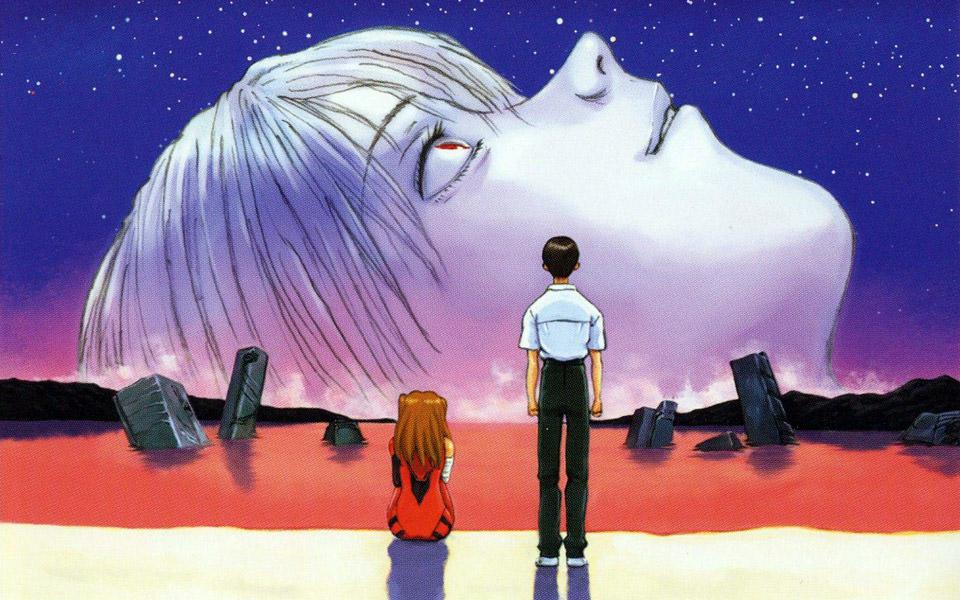At the end of June, Netflix added the Evangelion series into its streaming services. You can watch both the whole series and movies now. I’ll be honest: it’s been years since I watched Neon Genesis Evangelion and the proceeding movies that followed. From what I remembered, there were copious amounts of blood, violence and sexually-charged scenes with heavy imagery that lingered in the back of my mind. Of course, I had a feeling I would need to rewatch the series before viewing this movie.
It’s a good thing I did.
The End of Evangelion is the last of a two-part final installment of the original series. Completed with a new cast of English voice actors, the End of Evangelion is the replacement of the final two episodes of the series made into a full-length feature. The movie, in short, is about the end of the world. Characters we’ve fallen in love with die left and right, the utter destruction (or salvation) of humanity and one clone’s rebellion against her creator. We trespass into the main character’s mental psyche and fall into the realm of surrealism.
Let’s start at the beginning.
The pilots won a strategic battle with the Angels. Alas, there’s no time to celebrate: Shinji is mourning the loss of his friends, and NERV suffers from an internal malfunction. Rei Ayanami was just killed, Kaworu Nagisa had forced a heartbroken Shinji to destroy him, and Asuka Langley Sohryu is in a coma. NERV headquarters is under attack by the Japanese Strategic Self Defense Force (JSSDF), and a full-scale slaughter ensues on all staff present, armed or not. In this first act of the film, the narrative is constantly linear.
Now, why is JSSDF intent on wiping out NERV? Well, because of the opposing organization SEELE. Rewatching this accelerating violence is still shocking and horrifying, to put it mildly. Here were people who sacrificed everything to fight the Angels, only for their fellow humans to annihilate them like pests. The justification is turbid at best and cruel at worst.
Hands down, the most badass part of this movie was Asuka waking from her coma and fighting in the Unit-02. You can’t say this girl didn’t go down swinging. In her emergence from the sea, she literally lifts a steel ship right out of the water and uses it as a shield against a barrage of rockets. All of her anger, her hate, her fear went right into tearing apart SEELE’s Mass Production (MP) Evangelions. Years later, the mecha fight still has some serious solid animation. It’s robust, charged motions complimented with mechas. Even the gleeful, almost maniacal grin from Asuka was worth every moment leading up to the fight.
Now for the weakest part of the movie. Rei, the third clone, rejects Shinji’s father and fuses with the Angel Lilith as SEELE enacts the Third Impact. The result is as catastrophic as you’d imagine: everyone just dies, dissolving into LCL. Some die with dignity, some crying. As we watch Asuka’s Unit-02 get torn apart by the MP Evangelions, Shinji enters the Human Instrumentality Project and starts to lose his mind. At this point, so have I.
Inside the project, the scenes dissolve into a series of visitations: of memories, friends, and even his loved ones. A sequence of nonlinear visions bombards the screen, taking Shinji to different locations and having different conversations with the “dolls” within instrumentality. There’s no room to digest any information and, in my initial viewing, I wondered what’s real or what’s a part of Shinji’s hallucinations. Nothing is cleared up, and the last scenes are hamfisted with Shinji’s desires for humanity and human individuality. There are ample amounts of nudity and sexual innuendos from maternal figures that distracted me from the psychoanalysis.
Then we’re left wondering what becomes of the world after the Third Impact: a sea of LCL and crucified Evangelions hover over a beach with only Shinji and Asuka left battered and broken.
To be sure, you definitely need to watch the original series to understand anything about this movie. Even the first previous movie is hard to watch without the full context. The animation is beautiful, and the interpersonal relationships between the characters are heartbreaking, but ultimately, the film is unviewable without watching the original anime.
Also, whatever you do, don’t watch this with your grandma.
Have you seen The End of Evangelion? What did you think?


Comments are closed.